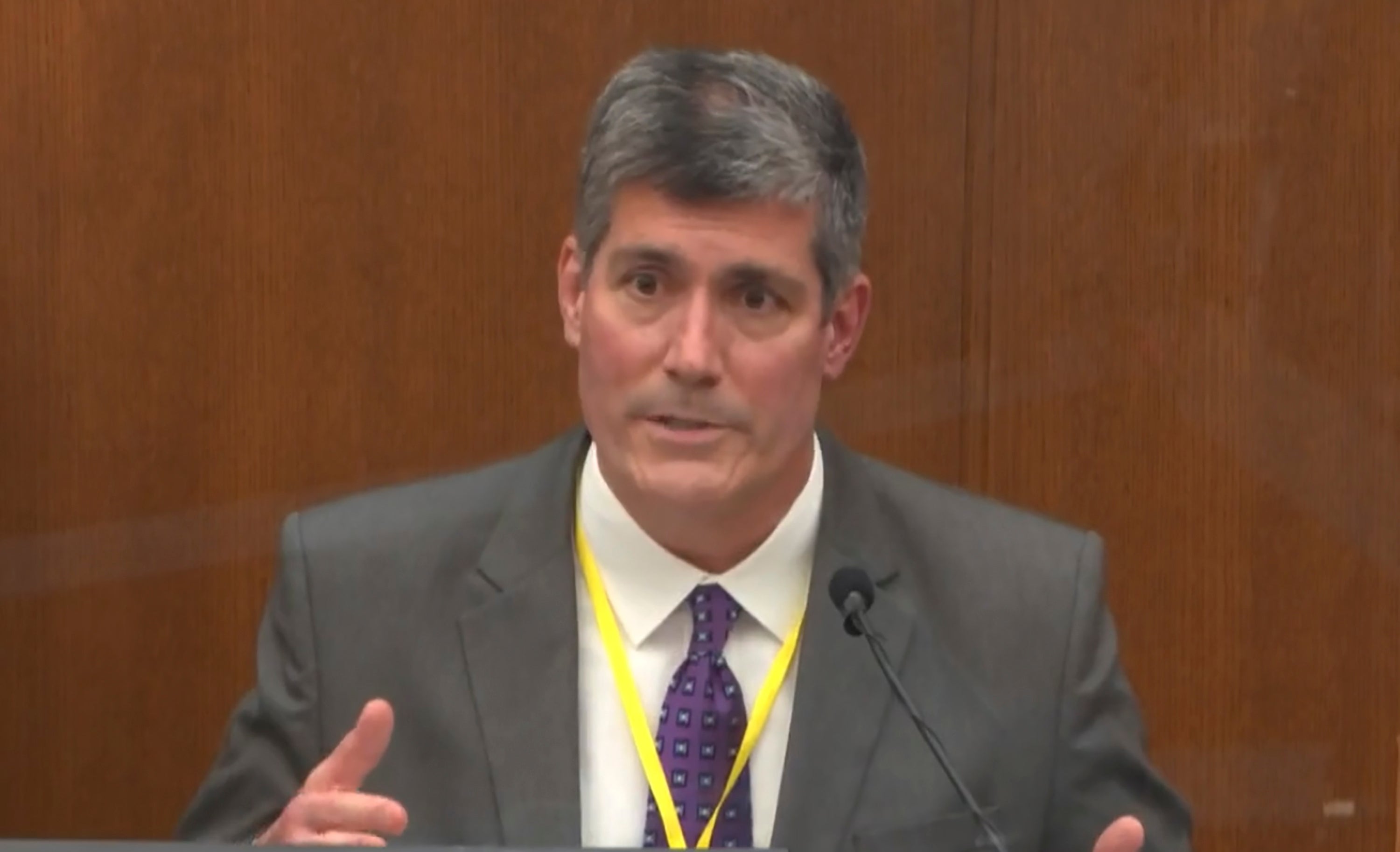Medical examiner on stand at officers' trial in Floyd death
The chief medical examiner who ruled George Floyd's death a homicide will return to the stand Tuesday at the trial of three former Minneapolis police officers charged with violating Floyd’s civil rights

Your support helps us to tell the story
From reproductive rights to climate change to Big Tech, The Independent is on the ground when the story is developing. Whether it's investigating the financials of Elon Musk's pro-Trump PAC or producing our latest documentary, 'The A Word', which shines a light on the American women fighting for reproductive rights, we know how important it is to parse out the facts from the messaging.
At such a critical moment in US history, we need reporters on the ground. Your donation allows us to keep sending journalists to speak to both sides of the story.
The Independent is trusted by Americans across the entire political spectrum. And unlike many other quality news outlets, we choose not to lock Americans out of our reporting and analysis with paywalls. We believe quality journalism should be available to everyone, paid for by those who can afford it.
Your support makes all the difference.The chief medical examiner who ruled George Floyd’s death a homicide will return to the stand Tuesday at the trial of three former Minneapolis police officers charged with violating Floyd’s civil rights.
Federal prosecutors say former Officers J. Alexander Kueng, Thomas Lane and Tou Thao violated their training by failing to act to save Floyd’s life on May 25, 2020, when fellow Officer Derek Chauvin knelt on the Black man’s neck for 9 1/2 minutes while Floyd was handcuffed, facedown and gasping for air. Kueng knelt on Floyd’s back, Lane held his legs and Thao kept bystanders back.
But defense attorneys have sought to show that the Minneapolis Police Department's training was inadequate.
Dr. Andrew Baker, the Hennepin County medical examiner, testified Monday that Floyd died after police “subdual, restraint and neck compression” caused his heart to stop. Baker said heart disease and drug use were factors but not the “top line” cause.
His testimony came after the former head of training for the Minneapolis Police Department, Inspector Katie Blackwell, testified for a third day. She has said that Kueng, Lane and Thao acted in a way that was “inconsistent” with department policies, including by failing to intervene to stop Chauvin, not rolling Floyd onto his side when he stopped resisting and not providing medical aid when he stopped breathing.
Floyd struggled with officers when they tried to put him in a police vehicle and after they put him on the ground. He repeatedly said he couldn’t breathe before going motionless. The videotaped killing triggered worldwide protests and a reexamination of racism and policing.
Blackwell testified that officers are told that if they use a knee to handcuff someone, they must put the person on their side and call emergency medical services because of the danger that their airway will be blocked.
Thao’s attorney, Robert Paule challenged Blackwell on whether the officers received adequate training, including on the use of neck restraints. He also presented department training materials from in-service training that Thao would have received on how to handle someone experiencing “excited delirium” — a disputed condition in which someone in an agitated state is said to sometimes have extraordinary strength that could trigger a more forceful restraint.
In videos, people were not stopped by Tasers and sometimes got away from police restraint. Also, officers sometimes used a knee to restrain people. But the training materials had just one sentence in a slide that said officers should put a person in the side recovery position.
Some medical examiners have attributed in-custody deaths to excited delirium, often in cases where the person became extremely agitated after taking drugs or while having a mental health episode or other health problem. But there is no universally accepted definition and researchers have said it’s not well understood.
Lane's attorney, Earl Gray, suggested that his client did what he was trained to do, including trying to de-escalate the situation, stopping his restraint when Floyd stopped moving, checking for a pulse and asking whether he should be rolled on his side. Lane also tried to help revive Floyd in the ambulance that eventually arrived.
But Blackwell said Lane didn't do enough when Floyd was in police custody, including checking to see if Floyd was breathing after he went unconscious and taking action to “physically stop the inappropriate force that was being used when no force was necessary.”
Kueng, who is Black, Lane, who is white, and Thao, who is Hmong American, are charged with willfully depriving Floyd of his constitutional rights while acting under government authority. One count against all three officers alleges that they saw that Floyd needed medical care and failed to help. A count against Thao and Kueng contends that they didn't intervene to stop Chauvin. Both counts allege that the officers’ actions resulted in Floyd’s death.
Prosecutors have argued that the “willful” standard can be met by showing “blatantly wrongful conduct” that deprived Floyd, 46, of his rights.
Chauvin was convicted of murder and manslaughter in state court last year and pleaded guilty to a federal civil rights charge. Lane, Kueng and Thao also face a separate state trial in June on charges alleging that they aided and abetted murder and manslaughter.
___
Webber contributed from Fenton, Michigan.
___
Find AP’s full coverage of the killing of George Floyd at: https://apnews.com/hub/death-of-george-floyd